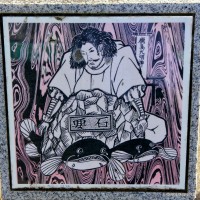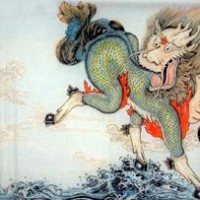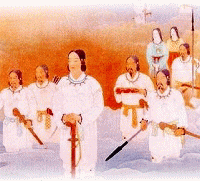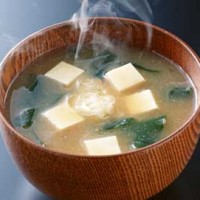blog
Friday: Kojiki (「乞食」ではなく『古事記』ですヨ!!) #19
07/03/2015 blog
Takemikazuchi (たけみかづち) Made It Happen Takemikazuchi (たけみかづち) and Amenotorifune (あめのとりふね), who were sent from Takamagahara (たかまがはら), said to Okuninushi (おおくにぬし), “Your son, Kotoshironushi (ことしろぬし), swore he would never defy Takamagahara. Is there anyone that might go against Takamagahara’s decision?” Okuninushi humbly said to both gods from Takamagahara, “I have another son called Takeminakatano Kami (たけみなかたのかみ). That is the only one that might protest to the Heavenly gods.” While his father was talking to the messengers from Takamagahara about him, Takeminakata came back with a huge rock, which could be pulled by a thousand people, juggled by his hands. Takeminakata said triumphantly, “Who is timidly whispering when visiting my …
Thursday: Japanese Food (日本の食べ物)
07/02/2015 blog
Shabu Shabu (しゃぶしゃぶ) (Ingredients) Shabu Shabu (しゃぶしゃぶ) is one of the Nabe Mono (なべもの) , which are cooked in quite a pot. Usually Nabe Mono are enjoyed during the winter season. People get together, surround the pot, and eat together while cooking by themselves. (Wikimedia: https://en.wikipedia.org/wiki/Shabu-shabu) Shabu Shabu is cooked at home and served in its speciality restaurants all over Japan. Depending where you live, ingredients are slightly different from one another, but the key is the freshness of beef, which is thinly sliced. The thinly sliced beef is the kind of meat you have hard time getting except the places where lots of Japanese grocery stores like Los Angeles …
Wednesday: Nihon-no Manga (日本の漫画)
07/01/2015 blog
Inakappe Taisho (いなかっぺたいしょう) This is another Judo animation aired on TV 1970 through 1972. “Inakappe” means “anybody from a rural country in Japan.” Tokyoites and all other city dwellers used this term as the derogatory. “Taisho” literally means “the head of a group, an organization, or a family,” but in this context, as “Inakappe,” it is used to make fun of the main character – a boy named Daizaemon. The plot from Wikimedia goes: A lively boy named Daizaemon in traditional Japanese clothing comes with various kinds of animals to the capital of Tokyo. He has a funny habit of dancing whenever he hears music. He visits a …
Tuesday: Nihon-no Kotowaza
06/30/2015 blog
Hara Hachibu-ni Isha Irazu (はらはちぶにいしゃいらず) [vocaburary] hara: the abdomen; the belly; the bowels; the stomach; a heart; spirit; guts. hachibu: 80% isha: doctors irazu: you don’t need … <word-by-word translation> You don’t need doctors if you don’t eat more than you need to. <transaltion> Temperance is the best physic [medicine]. or Feed by measure and defy the physician.
Monday: One Point Nihongo Clinic
06/30/2015 blog
Yes (はい) or No (いいえ)? Are you totally comfortable Japanese “Yes” or “No?” Situation: Yukiko overheard you say to your friend that you were NOT going to Yukiko’s birthday party next Saturday. Yukiko caught hold of you to ask you if that was true… Yukiko: “Are you … are you NOT coming to my birthday party next Saturday? I overheard you say so to Kumiko.” You: “No, I won’t. I’m invited to Takeo’s birthday party next Saturday. I promised to him I would come a couple of month ago. I wish I could.” ゆきこ:「あのう、らいしゅうのどようび、わたしのたんじょうびにきてくれないの?くみこさんにそういってたでしょ?」 あなた:「うん(はい)、いかないよ。たけおくんのたんじょうびにいくんだ、そのひは。なんかげつもまえからいくってやくそくしてたからね。わるいけどさ。」 In English, “Yes or No” and “Affirmation or Negation after that” coordinates with each other. …
Friday: Kojiki (「乞食」ではなく『古事記』ですヨ!!) #18
06/26/2015 blog
Takemikazuchino Okami (たけみかづちのおのかみ) So far, three gods from Takamagahara (たかまがはら), the Heavenly World, were dispatched to Ashiharano Nakatsu Kuni (あしはらのなかつくに), the Earthly World, but only in vain. Amaterasu Oomikami (あまてらすおおみかみ) was wondering who would be the next to accomplish their mission. Omoikaneno Kami (おもいかねのかみ) and other gods suggested to Amaterasu that she send Itsuno Ohabarino Kami (いつのおはばりのかみ), who lives in a holy cave upstream of Ameno Yasuno Kawa (あめのやすのかわ). They also said that Takemikazuchino Onokami (たけみかづちのおのかみ), his son, should go if Itsuno Ohabarino Kami or Ameno Ohabarino Kami (あめのおはばりのかみ) cannot. By the way, they continued, Ohabarino Kami is in the way to stop the water of Ameno Yasuno Kawa …
Thursday: Japanese Food (日本の食べ物)
06/26/2015 blog
Gomokuzushi (ごもくずし) Do you happen to know “Gomokuzushi (五目寿司・ごもくずし)?” This is one of festive foods, but is cooked quite often at home. The sound “zushi” comes from “sushi.” When you combine “sushi” with some other words to make one word, “su” sound turns into “zu” sound. So, you are supposed to call this kind “Gomokuzushi,” instead of “Gomokusushi.” As you see in Kanji, if you can read kanji, “gomoku” means “5 items.” Since this is a home cooking item, each household has its own recipe. In other words, each household use different ingredients for thier own “Gomokuzushi.” What matters most here is you are supposed to use 5 different colored …
Wednesday: Nihon-no Manga (日本の漫画)
06/24/2015 blog
Speed Racer (マッハGoGoGo) “Speed Racer” is an American title, imported from Japan. Original tytle of “Speed Racer” is “Mach (まっは) GoGoGo,” aired beteen April of 1967 and March of 1968. This TV anime became so popular that it had many re-runs later on. In “Speed Racer,” the name of main character is “Speed Racer.” In its original, his name is Mifune Go (みふねごう). His first name comes from the name of the title – “Go.” On the other hand, his last name is said to come from the family name of a Japanese big-name actor, Mifune Toshiro (みふねとしろう), without whom no Japanese Samurai movies have worked well. Here is the …
Tuesday: Nihon-no Kotowaza (にほんのことわざ)
06/23/2015 blog
Kirin-mo Oitewa Doba-ni Otoru (きりんもおいてはどばにおとる) = A genius grown old becomes worse than mediocre. [Vocaburary] Kirin (Kilyn): <art> A fiery horse (imaginary creature) drawn on Japanese or Chinese ceramic ware. Usually it is considered as a superior creature like a unicorn in Western World. Oitewa (Oiru): get old + -tewa (if you get old…) Doba: a hack; a jade; a worn-out horse Otoru: be inferior to; be worse than A genius cannot be a genius for the rest of his life.
Monday: One Point Nihongo Clinic
06/22/2015 blog
Sale? Bargain Sale? Bargain? Here is a typical conversation between you (a native speaker of English) and your Japanese friend. Your Japanese Friend: “Baagen Seeru-ni Ikimasho (「バーゲンセールにいきましょう。」).” You: ??? When your Japanese friend says, “Seeru (Sale)” or “Baagen Seeru (Bargen Sale),” she means “sale” for you, such as “Father’s Day Sale” or “Christmas Sale.” That is, ” Seeru (sale)” in Japanese almost always means “on sale.” You will be able to purchase a particular item or service for a discounted price. For the Japanese, there is not much difference between “(on) sale” and “bargain.” So, sometimes, like the example above, they say, “Baagen Seeru (bargain sale),” using 2 similar words …
Friday: Kojiki (「乞食」ではなく『古事記』ですヨ!!) #17
06/21/2015 blog
Conspiracy of Ameno Wakahiko (Gods in Takamagahara) Amaterasu Oomikami (あまてらすおおみかみ) suggested to her own son, Ameno Oshihomimino Mikoto (あめのおしおみみのみこと), that he should rule Ashiharano Nakatsu Kuni (あしはらのなかつくに). Then, he followed his mother’s suggestion. However, Amenohoshihomimi stood up on the heavenly bridge between the Heavenly World and the Earthly World and looked down at Ashiharano Nakatsu Kuni. He was disgusted by what was going on in the Earthly World, saying “Ugh, what caos down there!” He immediately took his way back to his mother and reported how he felt. He gave his mission back to his mother, Amaterasu. Takamimusuhino Kami (たかみむすひのかみ) and Amaterasu summoned all the gods to the riverbank of …
Thursday: Japanese Food (日本の食べ物)
06/18/2015 blog
Miso Soup (みそしる) [https://en.wikipedia.org/wiki/Miso_soup] (Typical Miso Soup – Tofu and Wakame) Do you like miso soup? Like it or not, one is served at Japanese restaurants, isn’t it? Just let you know – You don’t need a spoon. You will eat soup with hashi (a pair of chopsticks). Miso soup is made of miso (soy bean paste), which is made from soy beans. Also, depending on how much it was fermented, there are mainly 3 kinds of miso soup in Japan – Akamiso (あかみそ), Shiromiso (しろみそ), Awasemiso (mixture of the two – あわせみそ). Ingredients consist of Wakame (わかめ:Seaweed), Tofu (とうふ), Daikon ( だいこんらでっしゅ), Mituba (みつば: kind of ciantlo), and …
Wednesday: Nihon-no Manga (日本の漫画)
06/17/2015 blog
The Rose of Versailles (ベルサイユのばら) [https://en.wikipedia.org/wiki/The_Rose_of_Versailles] This Manga (まんが) became an epic hit in Japan in ’70s. As you see it, Riyoko Ikeda (いけだりよこ) is, no doubt, one of the most skillful Japanese cartoonists. The story line was based on the historical events during French Revolution and made “The Rose of Versailles (ベルサイユのばら)” an unforgettable piece. Although I myself was not such a big fan of this manga in those days, I had to admit that no Japanese person could have ignored this phenomenal social trend in those days. Ikeda Riyoko, because of “The Rose of Versailles” only, instantly became the Japanese J.K. Rowling (https://en.wikipedia.org/wiki/J._K._Rowling). The Takarazuka Revue ( たからづかかげきだん: https://en.wikipedia.org/wiki/Takarazuka_Revue) immediately …
Tuesday: Nihon-no Kotowaza (にほんのことわざ)
06/16/2015 blog
Todai Moto Kurashi (「灯台下暗し」) = You must go into the country to hear what news at London. [Todai: lighthouses; Moto: at the bottom of; Kurashi: dark] Did you ever notice that it is very dark at the bottom of the lighthouse? Likewise, you tend to overlook somewhere very close to you when trying to find it. Most of the time, it’s really worth it!
Monday: One Point Nihongo Clinic
06/15/2015 blog
Q: How different is “Watashi-wa Ikimasu. (「わたしはいきます。」) “ from “Watashi-ga Ikimasu. (「わたしがいきます。」)” ? A: Very different. “Watashi-wa Ikimasu.” is NOT really a complete sentence. You usually say, “Watashi-wa Yubinkyoku-ni Ikimasu. (「わたしはゆうびんきょくにいきます。」= I am going to a post office.)” or “Watashi-wa Puuru-ni Ikimasu. (わたしはプールにいきます。」= I am going to a pool.).” Something like that. You need to let your listener know where you are going now. Your listener’s interest is learning where you are going. You are giving out the information to your listener. He got an answer from you. That way, this conversation is now complete. “Watashi-ga Ikimasu.” is a complete sentence. Your listener(s) know where you are going before you said, “Watashi-ga …


















